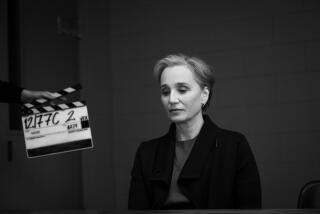Living Loud and Clear
- Share via
Working for the FBI, Sue Thomas was something of an anomaly. She could stand across an airport lobby while an illicit deal was going down and take verbatim note of what suspects were saying. Or, perched on a roof with a pair of field glasses, she could peer into a building across the way and read the lips of anyone she watched.
Although her first FBI job involved analyzing fingerprints in Washington, D.C., she was quickly moved to more challenging assignments when agents there, amazed at her exceptional ability to read lips, enlisted her for undercover surveillance in white-collar crime that would include drug and embezzlement cases.
Her unusual skill wasn’t something she’d planned. Thomas, who loves to play classical piano, has been deaf since she was a toddler. On Sunday “Sue Thomas: F.B.Eye,” a television series based on her life, premieres at 9 p.m. on the PAX TV network. The fast-paced, one-hour premiere segment opens with Thomas (played by severely deaf actress Deanne Bray) at work at the FBI.
“We are brought into this life for a purpose,” said Thomas, 52, a deeply spiritual woman who left the FBI after several years and now travels the country as a motivational speaker, sharing her experiences and offering a message of hope and perseverance.
Hope has been her message since she came to terms with her deafness after years of hating it, said Thomas, sitting on a bench at Richard J. Riordan Central Library with her hearing dog, Amazing Grace, at her side.
Seeing her story become a television series is the culmination of years of effort, she said. Indeed, 12 years ago, after her autobiography, “Silent Night,” was published, Columbia Pictures bought the movie rights but let the option expire, she said. After that, a Dutch film company bought the rights but couldn’t find the funding to bring it to the screen.
But brothers Dave and Gary Johnson, who wrote a screenplay based on the book, held onto the script.
When the network contacted them about doing a series, they had the idea ready to go.
Thomas worked for the FBI from 1979 until early 1983, when she left to attend a seminary in South Carolina because she wanted to have a “better understanding of my Creator and how he made me.”
At the Columbia Graduate School of Bible and Missions, she found her life’s calling. For nearly two decades now, she has earned her living speaking to hundreds of church, civic, educational and professional groups in 46 states, bringing them her uplifting message. In a busy year, she and Amazing Grace are on the road 200 days.
“I have a mouth, will travel,” said Thomas, who lives with her 89-year-old mother in Youngstown, Ohio, where her extended family is.
She lost her hearing suddenly and mysteriously when she was 18 months old. “One day I was sitting around watching cartoons with my family,” she said. “The next day I began visiting an endless series of medical specialists who brought forth the same proclamation of despair: I would never hear. I would never speak. I would never matter.”
But her parents were determined to help their daughter function in a hearing world. Thomas learned to speak by feeling the vibrations of her speech therapist’s throat and watching her lips form to make the words. She had many hours of voice, speech and drama training.
She also mastered figure-skating, becoming the youngest Ohio state champion freestyle skater in 1957 when she was 7. She learned to skate to music by keeping her eye on her coach who, like a conductor, marked the beat.
Her days in public school were miserable, she said, as she was subjected to relentless teasing by schoolmates. After a long painful day at school, she cried her way home on the school bus. To hide her tears, she remembered, she sat so close to the window that her nose would be squished against the glass. She sang “Silent Night”--the hymn her mother had taught her as she rocked her on her lap when she was a child, to ease her sorrow. Inspired by the comfort the song gave her, she borrowed it for the title of her autobiography.
As a young adult, Thomas said, she went through a long period of being angry with God and used alcohol and marijuana to ease her pain. Ultimately she realized that she had “to let God be God and let him put me back together the way he wanted me to be and for him to give us the grace to endure.”
After overcoming one disability, Thomas is learning to live with another physical challenge. Two years ago, she was diagnosed with multiple sclerosis. She is losing some vision, has trouble walking and has numbness in her right hand so severe it is nearly impossible for her to play the piano. Yet, even as she copes with the disease in which the body’s immune system attacks the insulation of nerve fibers, Thomas believes God will prepare her to handle it, even if she goes totally blind.
She hopes the TV series will help the American public gain a deeper understanding and respect for the people “who walk the path of silence,” and give hope to families who are struggling with a disability. “The show is for every parent who has a child with a disability,” she said. “It is for every child that has been bullied and called a dummy. It’s their story as well.”
More to Read
The complete guide to home viewing
Get Screen Gab for everything about the TV shows and streaming movies everyone’s talking about.
You may occasionally receive promotional content from the Los Angeles Times.






